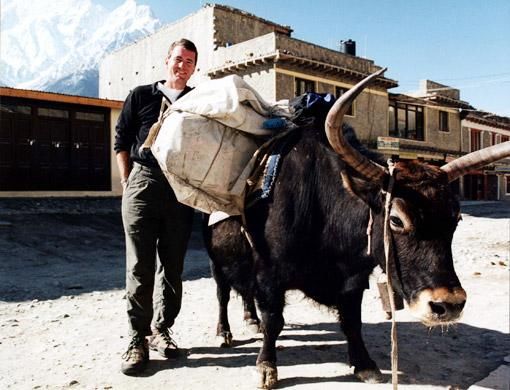When John Wood met a Nepalese man at the foothills of the Himalayas, his life was changed forever. He gave up a top position in Microsoft to set up a charity, Room to Read. Anand Raj OK meets the author of the bestseller Leaving Microsoft to Change the World.
"I am Pasupathi,'' a man who appeared to be in his mid-fifties with thick glasses and a typical Nepalese cap told John Wood, "and I am the district resource person for Lamjung Province.''
A cold wind was blowing from the snow-capped peaks and Wood, who was on day one of his 21-day trek in the Himalayas, had stopped by at a little mountainside restaurant in Kathmandu, Nepal, for a drink.
Pasupathi was seated at an adjoining table and sipping a steaming cup of the very sweetened but delicious Nepalese dudh chia (milk tea). "I am John Wood,'' the tourist acknowledged the Nepalese man's greeting.
The sun had begun slipping below the formidable mystical mountains and Wood zipped up his fleece jacket bracing himself for the early evening chill. A boy, hardly eight years old, came over to take his order, then raced off to execute it. Wood leaned back and marvelled at the indomitable spirit with which the young lad was running the lodge almost single-handed. "Are all children in Nepal this clever?'' he asked, turning to Pasupathi.
They have to be, Pasupathi told him. This small exchange seemed to bring two men from thousands of miles separating them closer. Pasupathi began explaining to Wood why a huge majority of children in Nepal dropped out of school, why schools in the remote area had very little resources and why "some days I am very sad for my country.
"I want the children to get a good education, but I am failing them.'' To Wood, the words held a pain and helpnessness that almost hit him like a thunderbolt.
Nursing his drink, Wood listened keenly as Pasupathi explained how he was trying hard to improve the education system in the villages of Nepal.
His words gave Wood an insight into the real Nepal – one that was far removed from the much-traversed trails of backpackers, trekkers and wannabe Everest conquerors.
"Can I accompany you on one of your visits to a school?" asked Wood. "Sure,'' the man said, then added, "Meet me here at seven am for tea.''
***
School library, the sign said in big bold letters, and the headmaster who was taking Wood on a little tour of the school in Bahundanda (which was a three-hour uphill trek on Wood's itinerary anyway) invited him to step inside.
What he saw amazed him. The room was empty except for a small cabinet and an old dog-eared world map covering one wall. It showed the Soviet Union, East Germany and other countries which had ceased to exist. Books, which one would expect to find in a library, were conspicuous by their absence.
"A beautiful library room,'' Wood acknowledged politely, "but where are the books?''
"Ah, the books,'' said the headmaster, then stepped outside and summoned a teacher who appeared with a key to open the lone cabinet in the room.
A Danielle Steel romance. An Umberto Eco novel written in Italian. The Lonely Planet Guide to Mongolia and Finnegan's Wake. These were the only books in the school's library and
as far as the students were concerned inaccessible – in almost all senses of the term.
Several thoughts raced through Wood's mind. He remembered how he used to visit his school library regularly and borrow as many books as he was allowed to; how he used to spend hours at the local libraries in his neighbourhood; how he struck a deal with the librarian so that he could borrow more than the prescribed number…
How can children not have access to books – something that people in many countries take so much for granted, he wondered.
The more he thought about the issue, the more he wanted to do something about it. Immediately.
"I would like to help your school,'' he told the principal and teachers who had assembled. "But I have only English books to offer. Would they be of any help here?'' Oh yes, the teachers said. Any book is welcome and any number will make a difference, they said. Then a pall of gloom fell over the faces of a few of them. "A lot of trekkers come here, see the conditions, promise to do something then we do not hear from them again,'' they said.
"Perhaps sir, you will some day come back with books,'' the headmaster said. Wood promised he would and bid goodbye to Pasupathi. "I will not say goodbye,'' Pasupathi told Wood. "Instead I will say pheri bhetaunlaa, that means ‘until we meet again'.''
***
John Wood was doing very well for himself. He was a jet-setting marketing director of Microsoft and a specialist in international markets. He lived in a luxurious apartment, he was on the fast track to marriage "with a six-foot, blue-eyed blonde'' and life could not have been more rewarding.
Yes, he was a Microsoft employee. That meant a fantastic profile but it also meant crazy working hours and a pressure cooker existence. He was "always trying to be in seven places at the same time'' to do presentations, take meetings, do press interviews…
His high-pressure job meant he was working almost seven days a week, shuttling between continents, building and expanding new areas of the company's operations… "During those years I believed that vacations were for people who were soft,'' he writes in Leaving Microsoft to Change the World, an absorbing and moving account of why he gave up a job every man on this earth hopes to hold to pursue a challenging philanthropic dream.
In fact there were times when, after returning from a long business trip, he used to be a trifle upset if there were no business related messages on his answering machine. "I used to think that the answering machine must be broken,'' he says in his book.
But one day after close to nine years in his job, Wood convinced himself that he had earned a break. He and a friend decided to unwind by going to a slide show, organised by a local adventure company, on trekking in Nepal.
So captivating was the show that even as the presenter was saying "The trek takes you as far out into the Himalayas as you could imagine'' Wood had made up his mind. He was going away to Nepal.
Back with books
That meeting with Pasupathi in the little lodge in Kathmandu was in several ways a turning point in Wood's life. It was to be his first step in a long trek in the world of philanthropy.
Throughout his stay in Nepal, the headmaster's words kept ringing in his ears: "Perhaps some day you will return with books.''
Keen not to let down the children in that small school, Wood, even before he left the mountainous nation, shot off e-mails to almost everybody he knew requesting them to donate whatever old books they had. "Send them to my dad and we will deliver them to those who need them,'' he wrote to his friends.
Wood's e-mail was forceful, touching and convincing. In his e-mail, one of the sentences reads, ‘Think how much books meant to you as a kid, or to your own children. Then imagine taking that away. It would have a profound impact on your life path'.
It did not take long for the books to land up at his father's home in Colorado. He received an e-mail soon from his father – ‘You need to get home soon!' His father's basement was overflowing with books as Wood realised when he reached home in Colorado.
A few months later, it was time to make another trip to Nepal – this time to keep his promise. "Perhaps sir, you will some day come back with books,'' a teacher had said. Wood was now returning with books for the kids.
Doing something
"It was sheer joy,'' says the genial Wood, in an exclusive interview with Friday. "The welcome I received, the glee on the children's faces when they saw the books, the happiness on the teachers' faces… it was overwhelming,'' says Wood, who was in Dubai recently to join hands with Dubai Cares for the Million Book Challenge.
A lot of people who witness dire conditions in underprivileged nations often remark that somebody somewhere should do something. "Instead of waiting for somebody to do something, I decided that I would do something myself,'' he says.
Having experienced the joy of seeing children with books they could read, Wood decided to step up the book collection drive and include more people, even organisations, in his mission to offer appropriate reading material to children who had no
access to books. He decided he would collect more books then return to Nepal to distribute them to as many schools as he could.
***
Back in the competitive corporate world, Wood got busy crisscrossing the world in pursuit of business. But at the back of his mind, the images of the children in that school in Nepal kept looping through his mind endlessly. He wanted to do something on a larger scale.
He learnt from a UN report on literacy that an estimated 850 million people in the world lacked basic literacy – in other words, one out of every seven people in the world did not know how to read or write a simple sentence. Even more disturbing, of this figure, two-thirds were women.
Wood wrestled with the figures and the entire issue of illiteracy for several months, then finally made up his mind.
Determined to do his bit to eradicate illiteracy, particularly among children and women, he decided to do what many people with a philanthropic bent of mind can only dream of – in 1999, he quit his cushy job with Microsoft. He then gathered a small group of committed individuals to form an organisation called Room to Read. Their mission: to provide quality educational opportunities to children in the developing world.
Run like a corporate entity (there is at least one other ex-Microsoft employee in his team), Room to Read would, in just a few years, help build schools in places where they were desperately required, raise funds for school libraries, make arrangements to have well-stocked bookshelves, publish books for children, offer scholarships for girl students…
"Oh no, it was not easy,'' says Wood, when asked what his thoughts were when he decided to quit a gilded job to enter the world of philanthropy. "I did think a lot about it. And the good thing was that my parents and a few friends (though not his girlfriend) supported my decision completely,'' he says.
Wood had some savings and some stock options in Microsoft. He decided to use part of his savings to set up the charity that would help educate children in less developed areas of the world. Once he made up his mind, nothing could stop him. He was lucky to have attracted a loyal, devoted and enthusiastic team to help him in his venture.
From donating books and helping local communities build schools in Nepal in 2000, Room to Read has spread its reach to Vietnam, Cambodia, India, Sri Lanka, Laos, Zambia and South Africa, working to bring about change in the literacy levels of children.
***
One of the features that sets Room to Read apart from many charity organisations is that it thinks big. "Yes, I believe in thinking big,'' says Wood. "Maybe it's my business mindset. Maybe it's got to do with the notion that nature abhors a vacuum. If there is a vacuum,
it either fills it with something positive or something negative.'' And Wood would want it to be filled with only positive things.
"It's like this: tens of thousands of children need a school. [There is a vacuum.] So what happens? We help the local people build a school [the positive input].''
He gives another analogy that is more aligned with corporate rules of engagement: "When a large company like Emirates, for instance, learns that there is a destination which should be serviced well by an airline, it recruits people, buys a plane and starts flights to that place. Then it introduces a second plane, then a third and soon it becomes a huge success. That's how business people think.
"Now as a business person, when I look out of my window, I see 68 million kids of primary school age who do not have access to a school at all. I see millions of children who do not have books to read. Millions of children who would love to go to school but cannot, simply because there are no schools.''
And that is what he would want to change – fill that vacuum with schools, libraries, books…
Setting an example
Room to Read doesn't just give a large sum of money to the local people and ask them to build a school or library. Neither does it build schools all on it own. "We partner with the local people at all levels,'' says Wood. This way,
the school is not seen merely as a gift and the local people begin to take an active interest in its upkeep and development.
To date, the charity has constructed over 400 schools, established more than 5,000 libraries, donated more than 2 million English language children's books and funded close to 7,000 long-term scholarships for girl students, among others.
"We believe that education can empower people to improve their socio-economic condition and we strive to break the cycle of poverty one child at a time. We offer scholarships to children who are either orphans or whose parents are unable to educate them for any reason.''
To illustrate he says, "We have taken it upon ourselves to educate many children whose parents perished in a slum fire in Delhi recently. The children are now studying in schools, have access to books and will some day be able to take care of themselves and their surviving families.''
Low overheads
Another major feature of Room to Read is that its operational overheads are very low. "We keep the overheads to a bare minimum,'' says Wood.
His colleague Robin Fern who looks after part of the charity operations from an office in Hong Kong seconds that. We channel 88 per cent of funds that is donated to Room to Read towards our projects, she says. "Just 12 per cent goes towards overheads.
"Room to Read has close to 250
staff members of which 60 work full-time,'' says Fern. The small number of full-time workers also helps keep the overheads low.
"As a leader, I try to set an example in ways to cut overhead costs,'' says Wood. "For instance, when I travel, a lot of my flights are sponsored by airlines and my stay by hotels. Sometimes even friends help out – they give me space in their homes, a couch to sleep on.''
Fern almost echoes Wood's words. "In fact, on this trip to Dubai I have
been staying with some friends of mine, sleeping on a sofa in their living room,'' she says.
"When we are travelling on fund-raising missions, we ask hotels if they would like to give us some days' complimentary stay. We send them a copy of my book and ask them whether they would be interested to do their bit towards the projects. And very often they agree,'' says Wood. "In Tokyo for instance, a hotel room goes for $400 a night.
And if I am there for five nights the cost works out to $2,000 – a sum we cannot really afford. So we ask a few hotels there if they can sponsor our stay.'' In fact Credit Suisse has sponsored office space for Room to Read in Hong Kong, says Wood.
"I, on my part, in the course of my fundraising talks, make it a point to mention the names of the hotels and airlines that have helped us,'' he says.
Win-win situations
"It's a typical win-win situation,''' says Wood. "That's the kind of things we do – create a win-win situation for everybody. It's like what Dubai Cares is doing now – encouraging children to read books. The result: parents are happy, teachers are happy, children are happy. Apart from gaining knowledge through reading, the children are also learning about philanthropy at a very young age – of the greatness of giving.
"For each book read, Dubai Cares donates one book to children in the developing world. So, while children are reading books, they are also getting books to children who may not have access to reading material but who love to read.
"We are proud to link up with Dubai Cares because they are thinking big, we are thinking big; they are thinking of bringing about change fast, we are thinking about bringing about
change fast,'' says Wood.
Lessons from Microsoft
Did his experience at Microsoft come in handy when setting up Room to Read?
"I learnt a lot from there,'' admits Wood. "Working with people like Steve Ballmer and others was wonderful.
"Those who offer 17 excuses when you ask them why something does not work need to speak to a person like Steve Ballmer. He will tell you (while banging his fist on the desk) that it is not your job to make excuses. Your job is to find ways to work around the problem and find solutions.
"I also learnt a lot from reading biographies of famous people. Biographies of [Mahatma] Gandhi, Nelson Mandela…
"If I am stuck on some issue, I take a step back and ask myself, ‘How would Steve Ballmer have tackled this problem?' Or ‘how would Mandela have sorted out this issue?'''
While on the topic of Microsoft, Wood says that he has great respect for Bill and Melinda Gates. "They are doing a wonderful job in the world of philanthropy with their immunisation programmes,'' he says. (The Bill and Melinda Gates Foundation is working towards offering quality healthcare for children in the developing world.)
Says Wood: "I think if there are just three things you could give a child, they would be immunisation, clean water and education. The world would be better off if children had these three things.
"Gates' programmes will give children a healthy life. Our programmes will give children a good education.''
***
Although Wood left a busy career with Microsoft years ago, he still continues to spend almost all his time working – expanding Room to Read, finding new avenues to work on, taking on new projects, giving talks at fundraisers, meeting with donors…
Does he still have time to read?
"I travel a lot so yes, I do get some time to read on the plane,'' he says. "At the moment I am reading a biography of Nelson Mandela. I like reading V. S. Naipaul, George Orwell, Milan Kundera, Doris Lessing, oh there are so many,'' he says.
Does he have time to indulge in a hobby? Wood gives out a throaty laugh then says: "I enjoy skiing, playing tennis, having a good conversation with friends… and because I travel a lot I have friends almost all over the world – in Hong Kong, India, Nepal, Vietnam, yes, even here in the UAE.''
A strong society
So what is his dream?
"My dream,'' says Wood leaning back in his chair and locking his hands behind his head, "is to see a society that is strong and successful. Many years from now, I would like to hear people who have really made it say that the positive changes that happened in their lives was facilitated by Room to Read; that they are who they are because of the intervention received from Room to Read. You know, education has a ripple effect – it can create major positive changes in society.''
Then he leans forward and reiterates his happiness of having joined hands with Dubai Cares. "Dubai Cares needs great NGOs, and NGOs like ours need funds. Great partnerships start with ambitions that are this big – like the ambition of Dubai Cares,'' he says, with pride for having partnered in the opening of a new chapter in children's education.
So is there going to be another book?
Wood throws back his head and smiles. "I am glad I took the title Leaving Microsoft to Change the World before Gates did,'' he says with a chuckle. "But yes, I would like to write another book.
"There are so many things that have happened since I first delivered a box of books to that school in Bahundanda in Nepal. Those children have grown up, people who received help from Room
to Read have grown up, their lives have changed…
"For instance, a boy whom I met in Vietnam a long time ago is now grown up and is changing the lives of a lot of people in his society. I would like to write about them. But writing a book takes a lot of time…'' And that is one thing this man has very little of.
Even as we are talking about time or rather the lack of it, Wood's colleague Fern, as if on cue, pops into the room. "There's another meeting in 10 minutes,'' she informs him. I look at my watch and realise I've overshot my stipulated time. As I begin to put away my writing pad, I ask Wood what he thinks about Room to Read.
"Room to Read is not about me,'' he says. "It's about all of us. I know a lot of people cannot do the kind of thing that I have done – quitting their job and taking up a cause for charity.
"I have done it but others can [pursue a philanthropic cause] in their own way – by participating in fund-raising drives, donating books or money to Room to Read so that it can help children.
"This mission is not about me, it's about all of us together,'' he says. "It's like what [US president-elect] Barack Obama has been saying… ‘It's not what I can do, it's what we can do'.''
Pasupathi, the district resource person in Lamjung Province in Nepal, would agree.
– Anand Raj OK is Pages Editor, Friday
(For more information and ways in which you can also make a difference to the lives of less privileged children: www.roomtoread.org)
Leaving Microsoft to Change the World by John Wood is available in all major bookstores. Part of the proceeds from the sale of the book goes towards Room to Read











